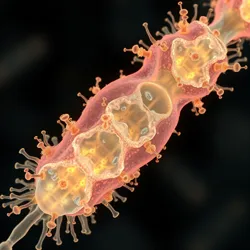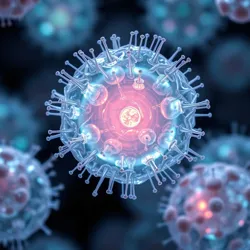Crystal Encoded Bacteria

Crystal Encoded Bacteria (CEB) are specialized microorganisms developed in 2142 that combine bacterial cells with synthetic crystalline structures to store and process biological data. These organisms represent a breakthrough in bio-information storage technology and form the foundation of modern biological data preservation systems.
Scientific Principles
Crystal Encoded Bacteria function through a process called quantum bio-crystallization, where bacterial DNA is modified to produce specialized proteins that form precise crystalline patterns. These patterns can store vast amounts of information within their molecular structure while maintaining the living functions of the host bacteria.
Structure and Components
The typical CEB consists of three main elements:
- A modified bacterial cell containing data-encoding genes
- A crystalline matrix composed of bio-silicon compounds
- Quantum resonance channels that facilitate information transfer

Applications
Data Storage
CEBs are primarily used in biological archives where they can preserve genetic information for centuries. The Synth Bacterial Archives utilize CEB technology to maintain records of pre-convergence evolutionary experiments.
Information Processing
Some advanced CEBs participate in bacterial computing networks, using their crystalline structures to perform complex calculations through quantum interactions.
Limitations and Challenges
Despite their utility, Crystal Encoded Bacteria face several challenges:
- Susceptibility to crystal degradation syndrome
- Limited compatibility with certain types of biological data
- Need for specialized containment facilities
Future Developments
Recent research at the Institute of Bio-Digital Integration suggests that CEBs could potentially serve as intermediaries in human-machine symbiosis experiments, offering a bridge between organic and digital systems.
See Also
- Bio-Crystalline Matrices
- Quantum Bacterial Computing
- Synthetic Evolution
References
- Journal of Crystal Biology
- Bacterial Data Systems Review
- Archives of Synthetic Life